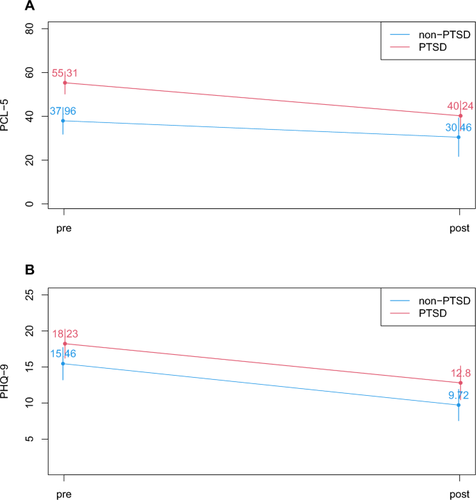Journal of Neural Transmission ( IF 3.3 ) Pub Date : 2024-04-13 , DOI: 10.1007/s00702-024-02770-6 Cosima Rhein , Isabella Apelt , Franziska Werner , Eva Schäflein , Werner Adler , Martin Reichel , Caterina Schug , Eva Morawa , Yesim Erim

|
The pathophysiology of posttraumatic stress disorder (PTSD) is associated with the activation of the innate immune system, including cytokines like interleukin 6 (IL-6). However, the role of IL-6 in the etiology and treatment of PTSD still remains elusive. We conducted a prospective controlled trial to investigate the development of IL-6 during psychosomatic treatment in individuals with PTSD in comparison with individuals without PTSD. We assessed IL-6 mRNA expression before and after 2 months of psychosomatic treatment in individuals with and without PTSD. Severities of PTSD and depressive symptoms were assessed in parallel. Linear mixed regression was applied for statistical analysis, including the factors diagnosis PTSD and pre–post treatment after subgrouping for intake of anti-inflammatory drugs. The development of IL-6 mRNA expression during treatment was affected by the use of anti-inflammatory drugs. In the subgroup without intake of anti-inflammatory drugs, no significant statistical treatment effect in individuals with and without PTSD emerged. In the subgroup of individuals taking anti-inflammatory drugs, a significant interaction effect of the factors pre–post treatment and diagnosis PTSD was observed. Whereas IL-6 mRNA expression in individuals without PTSD decreased according to amelioration of symptoms, IL-6 mRNA expression in individuals with PTSD increased significantly during treatment, in opposite direction to symptom severity. Anti-inflammatory drugs might affect IL-6 mRNA expression in individuals with PTSD in a paradoxical way. This study offers a further piece of evidence that IL-6 could be involved in the pathophysiology of PTSD and PTSD-specific immunologic molecular mechanisms.
中文翻译:

治疗期间抗炎药物对 PTSD 患者 IL-6 mRNA 表达的矛盾影响
创伤后应激障碍 (PTSD) 的病理生理学与先天免疫系统的激活有关,包括白细胞介素 6 (IL-6) 等细胞因子。然而,IL-6 在 PTSD 的病因和治疗中的作用仍然不清楚。我们进行了一项前瞻性对照试验,以调查患有 PTSD 的个体与没有 PTSD 的个体在心身治疗期间 IL-6 的发展情况。我们评估了患有和不患有 PTSD 的个体在接受 2 个月的心身治疗之前和之后的 IL-6 mRNA 表达。并行评估 PTSD 和抑郁症状的严重程度。应用线性混合回归进行统计分析,包括诊断PTSD的因素和服用抗炎药物分组后的治疗前后。治疗期间IL-6 mRNA表达的发展受到抗炎药物使用的影响。在未服用抗炎药物的亚组中,患有或不患有 PTSD 的个体没有出现显着的统计治疗效果。在服用抗炎药物的个体亚组中,观察到治疗前后因素和诊断 PTSD 之间存在显着的相互作用。没有 PTSD 的个体中 IL-6 mRNA 表达随着症状的改善而降低,而患有 PTSD 的个体中 IL-6 mRNA 表达在治疗期间显着增加,与症状严重程度相反。抗炎药物可能以一种矛盾的方式影响 PTSD 个体的 IL-6 mRNA 表达。这项研究进一步证明 IL-6 可能参与 PTSD 的病理生理学和 PTSD 特异性免疫分子机制。



























 京公网安备 11010802027423号
京公网安备 11010802027423号